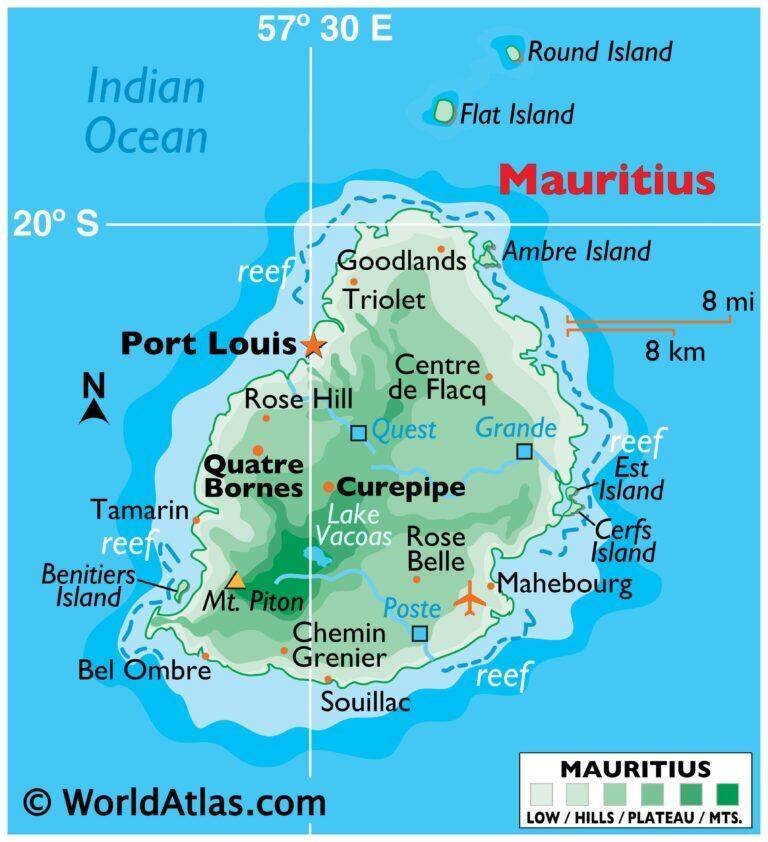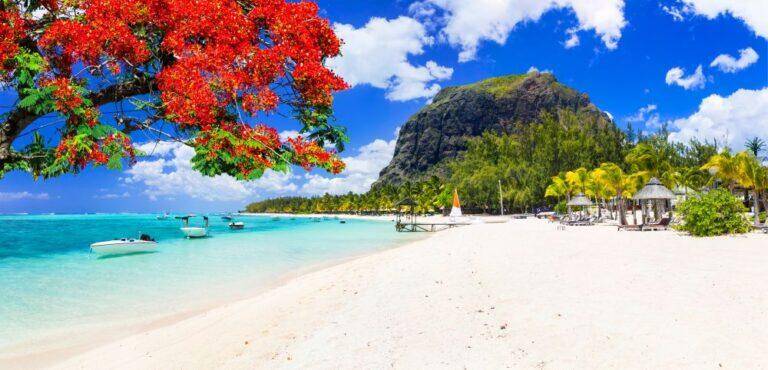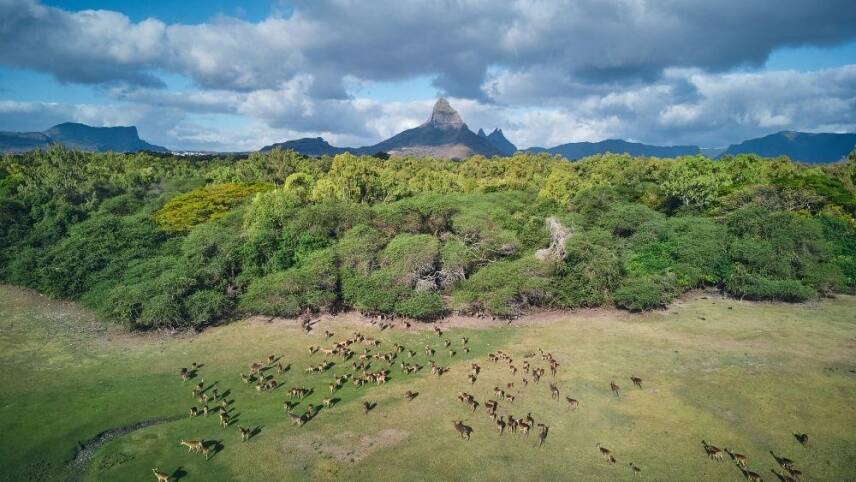Mauritius is a breathtakingly beautiful island with sandy white beaches, striking blue water, a wide variety of watersports and other tourist activities, and a range of top-class accommodation options. While many may know it as a honeymooners’ paradise, it is also home to some exciting game hunting activities. Find out more about the range of safaris available when hunting in Mauritius and why a trip to this tropical island should be on your bucket list.
[DYNAMIC-BLOGTABLEOFCONTENT]
Mauritius: An Overview
- Situated in the southern hemisphere, Mauritius is an island in the Indian Ocean, around 1,240 miles east of Madagascar.
- Mauritius is made up of the main island, together with several smaller outlying islands, such as Cerf’s Island and Ambre Island.
- The island of Mauritius was formed more than 8 million years ago, by volcanic activity.
- This volcanic activity has resulted in some unusual landscapes and environments.
- No volcanic activity has been recorded on the island for more than 100,000 years.
- Mauritius is 720 square miles in size and is one of the smallest countries worldwide.
- At its widest point, it is 40 miles long and 28 miles wide.
- The island is home to just over 1 million inhabitants.
- The island is known for its spectacular tropical beaches, amazing weather, and various tourist activities, making it one of the most popular island getaways for travelers looking for an unspoiled, natural island getaway.

Mauritius at a Glance
Capital City: Port Louis
Currency: Mauritian Rupee (MUR)
Languages: English (official), French, Bhojpuri, and Creole
Local Government: President with a multi-party system
Geography & Weather
Situated in the southern hemisphere, Mauritius is a tropical island with an average temperature of 73°F along the coast, reaching a slightly cooler 68°F in the higher altitudes of the island. The country experiences subtropical weather, which is influenced by its Indian Ocean location.
Summer is the wettest season in the region, with cyclone activity possible. Temperatures range between 80-93°F on the coast, with inland regions slightly cooler at 71-82°F. Winter weather is drier, with high winds causing rough and angry seas. Expect cooler temperatures of around 66-77°F inland, and 71-82°F along the coast.
The island is prone to storms, with tropical storms and cyclones hitting between mid-November to mid-May.
The area is characterized by its coral reefs, central plateau, and mountain ranges.
This picturesque island is known for its sandy white beaches and crystal-clear blue waters, providing the perfect backdrop for an idyllic island holiday. Coral reefs surround the island, providing much-needed protection against fierce storms and high seas during the winter months when cyclones and tropical storms hit.
Northern Mauritius is comprised of plains, leading to the central plateau, reaching heights of 885-2400 feet.
The central plateau is around 2,200 feet, with fertile lands, sugar cane fields, and a reservoir, namely Lake Vacoas. This is the primary water source on the island and most of the water comes from here, while the Grand River South East and Black River are utilized for hydro-electric power.

The Mauritian Economy
When booking and planning any hunting safari, it is always good for the hunter to upskill themselves to know just a few key points regarding the country’s economy. You never know when this information may come in handy, whether striking up a conversation on the airplane or chatting with your local outfitter.
The three main pillars that drive the Mauritian economy include:
- The Services Sector (68% of GDP): This sector includes professional services, financial services and tourism. Figures show that tourism alone contributed 13,1% of the GDP in 2023.
- The Manufacturing Sector (12-17% of GDP): This sector historically includes textile manufacturing and sugar production.
- Agriculture (3% of GDP): Agriculture includes vegetables, fruit, flowers and sugar.
Since Covid, the economy has grown, with an increase in tourism, financial services, and agricultural revenue.
What is Mauritius’s currency?
When booking a safari hunting adventure anywhere worldwide, knowledge of the local currency is always a good thing. The local currency for Mauritius is the Mauritian Rupee (MUR). US Dollars are not widely accepted on this island, and if they are, poor rates of exchange are offered.
Exchange your US Dollars for Mauritian Rupees at the airport, at ATMS, or at local banks.
Which languages are spoken in Mauritius?
English is the official language, with Creole widely spoken by the local population. Other spoken languages include French and Bhojpuri.
Health & Vaccines
While no specific vaccines are required for entry into Mauritius, it is recommended that all routine vaccinations are updated before a Mauritius hunting safari.
These include:
- Tetanus: Booster every 10 years
- Polio, MMR, Tdap (tetanus, diphtheria, pertussis)
Mauritian Independence
Mauritius gained independence from the United Kingdom on 12 March 1968. This has since been celebrated as National Day. The current President of Mauritius is Dharambeer Gokhool, who has been in office since 6 December 2024.
Major Towns on the Island
Although only 790 square miles, Mauritius has several large towns that play an important role in the heritage, culture, tourism, and other commercial industries.
- Port Louis: The island’s capital city is situated on the north-western side of the island. Apart from being the financial center, it is also renowned for tourist activities including the Caudan Waterfront for dining and shopping, and the Central Market, home to local crafts and street foods.
- Beau Bassin-Rose Hill: A residential and commercial hub.
- Vacoas-Phoenix: An administrative and educational hub, including Ebene Cybercity, which is the Mauritian tech and business hub, and the University of Mauritius.
- Quatre Bornes: This city is known for its local markets, shopping malls, and nightlife.
- Curepipe: Curepipe is the second largest city in Mauritius, often referred to as the “City of Lights” for its beautiful colonial-era street lights.
Travel Requirements
Flights
- International flights will touch down at Sir Seewoosagur Ramgoolam International Airport, in Plaine Magnien.
- The airport is located around 30 miles from the country’s capital, Port Louis.
- While there aren’t any direct flights from the United States of America to Mauritius, there are numerous international airlines that fly into the country, from Europe, Asia, and Africa.
- Mauritius’s national carrier, Air Mauritius, has connections from Johannesburg (South Africa), Paris (France), London (UK) and Singapore (Singapore).
- Other international airlines flying into Mauritius include, amongst others, British Airways, South African Airways, Emirates, Air France, Lufthansa, and Turkish Airlines.
- Regional airlines also offer budget options, such as FlySafair in South Africa, Kenya Airways, and Reunion’s Air Austral.
- The most direct route from Africa would be via Johannesburg, with a flying time of between 3h55 – 4h15.
Visa Requirements
US citizens do not require a visa to enter Mauritius for tourism or business stays under standard conditions.
They do, however, need to meet the following criteria:
- They are allowed to stay for up to 180 calendar days for tourism and 120 calendar days for business activities.
- For entry into Mauritius a person requires:
- A valid passport with at least 6 months validity after the expected stay
- Proof of sufficient funds (minimum of US$100 per day)
- Confirmed hotel booking or sponsorship letter
- Onward / return ticket
- For stays longer than 180 days, a premium visa is required.
Hunting in Mauritius
This Indian Ocean island provides the perfect background for combining a luxury family holiday, together with a memorable Mauritius hunting trip. While it is difficult to bring your own firearm into the country, outfitters are well-equipped with guns that are included in your hunting package.
Hunting Grounds
Mauritian hunting grounds offer a variety of terrain, including sugar cane fields, mountainous forests, and wooded hills.
Species on offer
- Rusa Deer: These deer were introduced from Java in 1638 and thrived. There are more than 60,000 deer in various areas across the island, with numbers for BelOmbre alone estimated at around 2,500. These deer are challenging to hunt, as they have an excellent sense of smell (can smell hunters up to half a mile away), are very wary, and are incredibly intelligent. Their habitat consists of dense forests and sugar cane plantations, providing the perfect cover for them to avoid hunters.
- Wild boar: These boars are hunted throughout the year and provide an exciting safari for hunters looking for a different hunting adventure. With the ability to sniff out hunters up to half a mile away, a running speed of 25 miles per hour, combined with a jumping ability of up to 5 feet, these hogs are an exciting challenge to target.
Mauritius Hunting Seasons
- Hunting in Mauritius is primarily to manage ecosystems and targets invasive species.
- The Mauritius hunting season differs according to the species you are hunting.
- Wild boar are available to hunt throughout the year, while Rusa deer hunting in Mauritius can be undertaken annually between 01 June to 30 September with driven hunts and using the walk and stalk method, from 15 May to 15 December.
Hunting Terrain
The vegetation is a combination of open fields, dense jungle and forests, hills, and rugged mountains, offering wildlife a mixture of habitats.
Hunting Methods
Methods used when hunting in Mauritius differ as to the game which is being targeted. For example, Rusa deer are often hunted in spot-and-stalk scenarios, although blinds can also be used effectively.
Mauritius hunting safaris featuring wild boar often see driven hunts, walk-and-stalk or bow hunting is even used to harvest these hogs.
Add Some Fishing to the Hunting Safari
Deepsea fishing is often incorporated into hunting packages, and why not: Mauritius is home to some spectacular fish species and bountiful fishing grounds. Target fish species in Mauritius include blue marlin, black marlin, swordfish, Wahoo, Tuna, Dorado, and Barracuda.
Combining Mauritius hunting safaris and fishing expeditions is the perfect way to experience the destination on land and at sea, with extraordinary trophies available during both activities.
Mauritius: A World-class Tourist Destination
When it comes to tourism, Mauritius ticks off the boxes, offering a kaleidoscope of activities, adventures, and experiences to enjoy.
Let’s look at some of the options available:
- Pristine Beaches with an Array of Watersports: Mauritius is home to some of the most spectacular beaches worldwide, with powder-soft white sand and brilliant blue water with many tourists happy to sit back, enjoy the view and soak up the sun. There are also numerous watersports activities available for those wanting something a bit more adventurous, including snorkeling, kayaking, stand-up paddleboarding (SUP), waterskiing, parasailing, scuba diving, and sailing.
- Cultural Tourism: Mauritius offers tourists a range of festivals, sites, and traditions to enjoy during their time on the island. From the Martello Tower Museum, local art and craft markets, and various UNESCO sites, the island is alive with opportunities to enjoy the local culture. Why not pop in at local Sega Tipik performances, and learn the intricate steps to a traditional Mauritian dance?
- Enjoy the Pristine Wilderness: Visit one of the island’s many game reserves that include hiking trails, sunset safaris, and even quad biking. The island is home to a wide array of fauna and flora; enjoy your time there and experience nature at its best.
- Culinary Delights: Mauritius is renowned for its exceptional cuisine! The island is a kaleidoscope of flavors, where the fusion of cultural influences together with the freshest quality ingredients creates unforgettable culinary experiences. From Indian, Chinese, French, and Creole influences, come the most delectable cuisine options to taste. Being an island, the seafood is legendary, and no trip is complete without tasting octopus curry, a local favorite.
What makes Mauritius an incredible game hunting destination?
Hunting in Mauritius is more than just about the trophies. It’s about the diverse experiences enjoyed while you are there: From the second you land on this tropical island, with its friendly locals, and breathtakingly beautiful beaches, you’ll feel at home.
It’s the experience of hunting on extinct volcanic terrain, with the excitement of harvesting the Rusa deer and wild boar in dense forests one day and enjoying deep-sea fishing the following one. It’s the experience of the wind in your hair and the rod in your hand as you sit on the boat, reliving that perfect shot that resulted in your deer trophy, as the sharp pull on your fishing line brings you back to the present and the possible catch on your line.
Mauritius hunting adventures combine the best of both worlds, where hunters can enjoy their time targeting unique trophies in the area, while still enjoying family time at a top island resort. It’s a place where kids can create endless sand castles and families make memories…it’s the perfect hunting island getaway.
